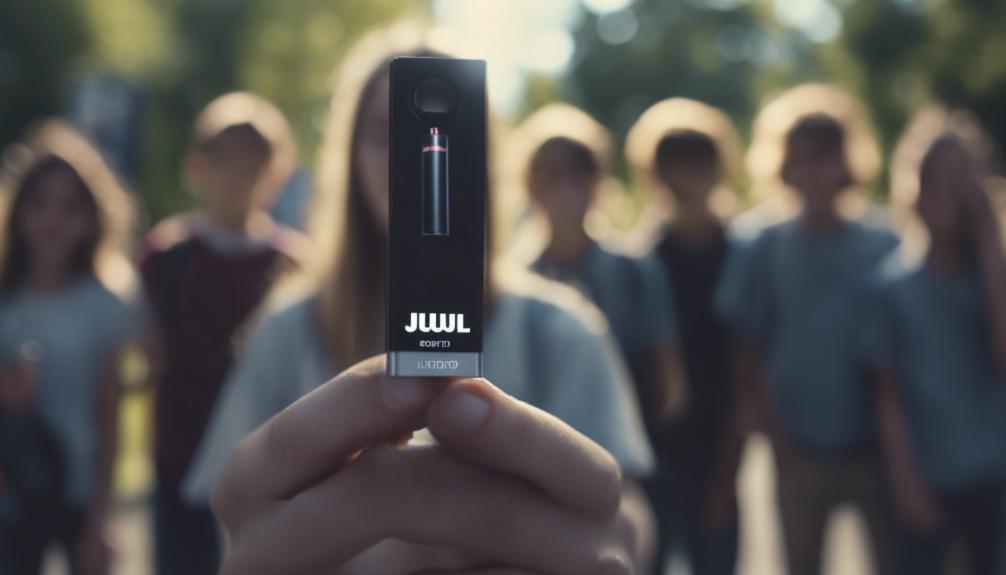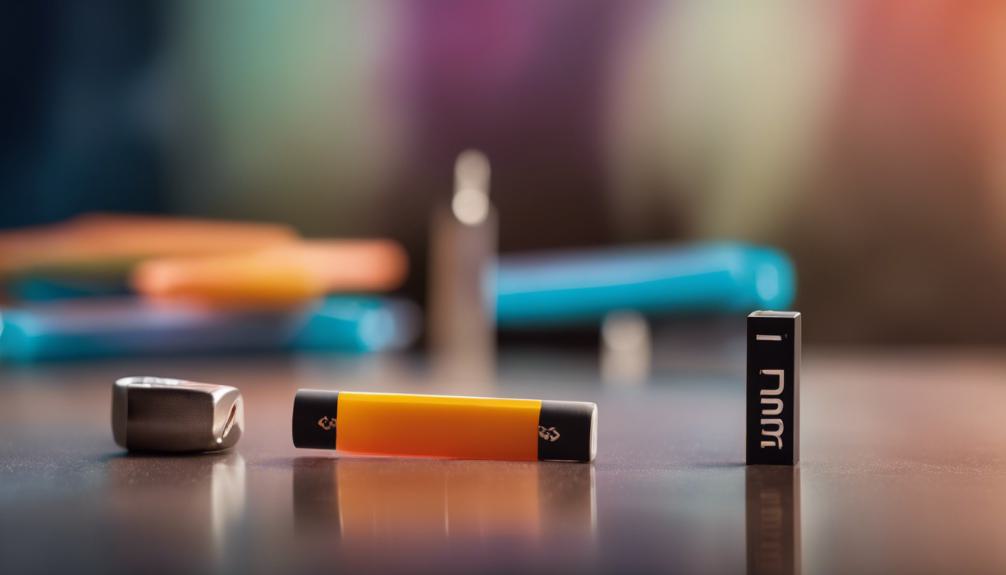JUUL Settles Teen Marketing Lawsuit
The recent settlement between Juul Labs and North Carolina, amounting to $40 million over allegations of marketing e-cigarettes to teenagers, marks a significant juncture in the crusade against youth-targeted advertising in the vaping industry. This lawsuit, initiated in 2019, has not only brought to light the aggressive marketing tactics employed by Juul but also set a precedent for how e-cigarette companies might be regulated moving forward. As we consider the broader implications of this legal outcome, one must ponder how this will shape the future of e-cigarette marketing, youth vaping trends, and the overarching public health narrative. The unfolding developments promise to ignite a thorough discourse on the balance between commerce and consumer protection in the rapidly evolving e-cigarette market.
Key Takeaways
- Juul Labs has agreed to a $40 million settlement with North Carolina over marketing practices.
- The lawsuit accused Juul of targeting minors and minimizing health risks.
- As part of the settlement, Juul must implement stricter age-verification and limit certain flavor sales.
- Funds from the settlement are allocated for addiction programs and prevention measures.
Background of the Lawsuit

In 2019, Juul Labs found itself at the center of a legal storm when it was sued by North Carolina for allegedly marketing its vaping products to teenagers, thereby downplaying the associated health risks. This landmark case illuminated the broader concerns surrounding the influence of vaping companies on young populations and the potential long-term health implications. The lawsuit propelled a national conversation on the ethics of marketing strategies targeting vulnerable groups and underscored the imperative for regulatory oversight. For those dedicated to serving others, especially in public health and legal sectors, this situation underscored the urgent need for vigilance against practices that could harm youth. It highlighted the critical role of advocacy and legal action in safeguarding public health and setting a precedent for accountability in the industry.
Allegations Against Juul

Building on the background of Juul Labs' legal challenges, allegations against the company further highlight claims of targeting youth through marketing strategies and ignoring the potential health risks of its products. These allegations form a critical component of the narrative surrounding Juul's legal issues, as they underscore the serious concerns regarding public health and consumer protection. Legal actions have brought to light accusations that Juul Labs not only engaged in practices that could attract younger demographics but also did not adequately address or disclose the health implications associated with the use of their vaping products. Such claims have prompted a reevaluation of marketing practices within the industry and have sparked discussions on the necessity for stricter regulatory oversight to safeguard the well-being of consumers, particularly the younger population.
Marketing to Teens

Juul Labs' controversial marketing strategies have sparked significant debate over their targeted appeal to the teenage demographic. The company's approach has raised concerns among parents, health professionals, and regulators alike, who argue that such tactics not only undermine efforts to discourage nicotine addiction among youths but also morally compromise the integrity of marketing practices. The essence of responsible marketing is to endeavor the community's well-being, including protecting vulnerable groups from potentially harmful products. As society works to cultivate environments that foster the healthy development of its younger members, the role of companies in adhering to ethical marketing standards becomes paramount. Engaging with teens in a manner that prioritizes their health and safety above commercial interests is a fundamental responsibility that all businesses should embrace.
Legal Proceedings

Understanding the significance of ethical marketing, particularly in relation to teen audiences, naturally leads to an examination of the legal consequences companies face when they neglect such responsibilities. Juul Labs' legal proceedings underscore the serious repercussions of targeting vulnerable demographics with potentially harmful products. The lawsuit filed in 2019 accused Juul of intentionally marketing to children and minimizing the risks associated with their products. This case not only highlights the ethical breaches in marketing strategies but also emphasizes the legal accountability companies must bear. The restrictive order obtained against Juul, barring them from selling flavored products without FDA approval and mandating a cessation of youth-targeted marketing, serves as a pivotal moment in the battle against unethical marketing practices. It underscores the importance of adherence to ethical and legal standards to protect consumer health and welfare.
Settlement Details

In a landmark agreement, Juul Labs has settled with North Carolina for $40 million, marking a significant response to allegations of marketing their products to teenagers. This settlement not only addresses the financial aspect but also commits Juul to implement stringent measures aimed at preventing youth access to and interest in their vaping products. These measures include investing in programs designed to educate young people about the dangers of nicotine addiction and enhancing age-verification processes on sales channels. By taking these steps, Juul demonstrates a commitment to rectify the impact of its past marketing strategies and to foster a safer environment for young individuals, ensuring they are better protected from the allure of vaping products. This agreement serves as a precedent, encouraging responsible marketing practices within the industry.
Financial Implications

The settlement with North Carolina, amounting to $40 million, places significant financial responsibility on Juul Labs, potentially influencing the company's future marketing and operational strategies. This substantial financial outlay not only reflects the gravity of the allegations against Juul but also serves as a stern reminder to corporations about the repercussions of disregarding consumer welfare, particularly that of minors. The allocation of these funds towards addiction programs and age-verification measures underscores a commitment to rectify past missteps and safeguard future generations. Such financial implications highlight the broader societal costs associated with corporate negligence and underscore the importance of ethical business practices. For organizations dedicated to serving the community, this case exemplifies the tangible impact that legal and financial accountability can have on promoting public health and consumer safety.
Marketing Restrictions

Reflecting on the financial implications of the Juul settlement, it becomes imperative to examine the imposed marketing restrictions and their potential to reshape industry practices. The settlement mandates Juul to overhaul its marketing strategies, specifically targeting the prohibition of appeals to younger demographics. This pivotal move aims to safeguard vulnerable populations from the allure of nicotine products by strictly regulating how such products are presented and to whom they are targeted. By enforcing these constraints, the initiative not only seeks to rectify past misdeeds but also to set a precedent for responsible marketing within the vaping industry. The commitment to prioritize public health over profit serves as a beacon for companies, urging them to adopt ethical practices in their outreach efforts. This shift underscores a collective responsibility to protect and serve our communities, fostering a safer environment for all.
Age Verification Measures

As part of the settlement, Juul Labs is required to implement stringent age-verification measures to guarantee their products are not sold to minors. This initiative underscores the company's commitment to responsible marketing and distribution practices, ensuring that their vaping products are accessible only to adults. The implementation of advanced age-verification systems at points of sale and online shopping portals is a critical step towards protecting young individuals from the potential harms of nicotine addiction. By enhancing the rigor of these checks, Juul Labs aims to foster a safer environment, minimizing the risk of underage vaping. This effort not only reflects the company's adherence to legal obligations but also its dedication to serving the community by prioritizing public health and safety.
Impact on Juul Sales

Juul Labs has experienced a significant decline in sales following the implementation of stringent age-verification measures and the settlement of lawsuits related to marketing practices targeting teens. This downturn reflects the broader impact of legal and regulatory actions aimed at curbing underage vaping. The lawsuits, particularly the settlement with North Carolina, underscored the company's responsibility to prevent youth access and addiction, leading to a rigorous reevaluation of its sales strategies. The enforcement of these measures, while necessary for public health, has naturally led to a decrease in market reach, particularly among younger demographics previously exposed to the brand through targeted marketing efforts. This shift highlights the importance of ethical marketing and the direct influence of regulatory compliance on company sales.
Response From Juul

In light of the significant sales downturn and legal challenges faced, Juul Labs has announced a series of strategic responses aimed at addressing concerns over its marketing practices and reinforcing its commitment to responsible business conduct. The company has pledged to overhaul its marketing strategies, focusing on adult smokers while ensuring that its products do not appeal to the youth. This includes the cessation of advertising campaigns perceived as targeting younger demographics and the implementation of more robust age-verification processes both online and at retail points of sale. Juul Labs also commits to investing in community programs designed to prevent underage use of vaping products. Moreover, the company has expressed its intention to work closely with regulators, public health officials, and other stakeholders to support and promote public health objectives.
Public Reaction

Public response to Juul Labs' settlement and its efforts to overhaul marketing strategies has been mixed, with some praising the company's commitments and others questioning their sufficiency in addressing the core issues. Advocates for public health and consumer protection have welcomed the settlement as a step forward in holding companies accountable for actions that potentially harm the youth. However, skepticism remains among parents, educators, and health professionals who are deeply concerned about the long-term impact of vaping on teens. Many urge for more stringent regulations and transparency in the industry to guarantee that such incidents do not recur. The settlement has sparked a broader conversation about corporate responsibility and the importance of protecting young individuals from addictive substances.
Future of Teen Vaping

While the settlement with Juul Labs marks a significant step in addressing marketing practices targeting youth, the broader issue of teen vaping continues to present challenges and necessitates ongoing vigilance and action. The resolution of this case underscores the urgent need for thorough strategies to protect young people from the allure and dangers of vaping. Stakeholders, including parents, educators, and policymakers, must collaborate to develop and implement effective educational programs that highlight the risks associated with vaping. Additionally, the establishment of stricter regulations around the sale and distribution of vaping products is vital to curb their accessibility to minors. The collective efforts of the community are essential in fostering an environment that prioritizes the health and well-being of our youth, steering them away from potentially harmful behaviors.
Monitoring Compliance
Monitoring compliance with the settlement terms set forth by Juul Labs necessitates a rigorous, multi-faceted approach to guarantee that marketing practices no longer target underage consumers. This involves a continuous and thorough review of Juul's advertising strategies, partnerships, and distribution channels to make sure adherence to the agreed-upon guidelines. It also includes the implementation of stricter age-verification processes both online and at retail points of sale to prevent minors from accessing Juul products. Additionally, oversight mechanisms, such as the appointment of an independent monitor, may be employed to conduct regular audits and provide transparency and accountability. By adopting these measures, stakeholders aim to uphold the integrity of the settlement and protect the well-being of the youth, demonstrating a commitment to responsible business practices and community welfare.
Preventing Future Violations

To effectively prevent future violations, stringent regulatory frameworks must be established and rigorously enforced, ensuring that marketing practices strictly adhere to legal standards designed to protect vulnerable populations. This approach necessitates a collaborative effort between regulatory bodies, companies, and the community to foster an environment of accountability. Education plays a vital role in this process, not only for those within the industry but also for the public, to understand the implications of harmful marketing strategies. Additionally, implementing advanced monitoring systems that can detect early signs of non-compliance will enable swift action to prevent potential harm. Ultimately, a commitment to ethical marketing, supported by robust legal and regulatory measures, is essential in safeguarding the interests of the public, particularly the youth, from misleading and predatory practices.
Frequently Asked Questions
How Does the Juul Settlement Compare to Settlements or Penalties Faced by Traditional Tobacco Companies for Similar Allegations?
The comparison between the settlement reached by Juul Labs and those historically faced by traditional tobacco companies reveals a significant evolution in legal and societal responses to marketing practices targeting younger demographics. Traditional tobacco companies have faced substantial penalties and restrictive measures over decades for similar allegations. However, the Juul settlement underscores a contemporary focus on preventative measures, such as funding for addiction programs and stringent marketing restrictions, aimed at protecting youth from nicotine addiction.
What Specific Health Issues Have Been Directly Linked to Juul Usage Among Teens, and Are There Any Long-Term Studies Underway?
In the shadow of rising concerns, studies have linked Juul usage among teens to significant health issues, including respiratory problems and nicotine addiction. These conditions not only challenge the immediate well-being of young individuals but also pose potential long-term health risks. Research is ongoing, with scientists and health professionals working tirelessly to understand the full extent of the impact. Their dedication serves the community's need to protect its younger members from such adverse effects.
How Will the Funds Allocated for Addiction Programs and Age-Verification Measures Be Distributed and Monitored to Ensure They Are Effectively Utilized?
Ensuring the effective utilization of funds allocated for addiction programs and age-verification measures requires a structured oversight mechanism. This involves regular auditing, transparent reporting, and stakeholder engagement to monitor the allocation and impact of these resources. Collaborating with organizations specializing in addiction recovery and implementing stringent age-verification technologies are critical steps. Additionally, engaging with affected communities to assess needs and effectiveness can enhance the accountability and success of these initiatives.
Are There Any Implications of the Juul Settlement for International Markets Where Juul Products Are Available, Especially Regarding Marketing Practices and Age Verification?
The resolution involving a prominent e-cigarette manufacturer may set a precedent affecting global markets, particularly regarding marketing practices and age verification protocols. International stakeholders should anticipate potential regulatory changes and increased scrutiny on promotional activities targeting younger demographics. Such developments could necessitate the adoption of more stringent age-verification measures globally, ensuring that e-cigarette products are marketed and sold responsibly, aligning with efforts to safeguard public health.
What Role Did Consumer Advocacy Groups and Parents of Affected Teens Play in Bringing the Lawsuit to Attention and Influencing the Settlement Outcome?
Sailing through the stormy seas of consumer protection, advocacy groups alongside parents of affected teens played a pivotal role in spotlighting the critical issues, thereby catalyzing the lawsuit's progress. Their relentless pursuit of justice and heightened awareness greatly influenced the settlement's outcome, ensuring that future marketing practices are scrutinized for public safety. Their efforts underscore the power of collective action in championing the cause of vulnerable demographics, particularly youngsters, against corporate malpractices.
Conclusion
In the shadow of a landmark legal settlement, the landscape of e-cigarette marketing faces a transformative shift. Juul Labs, once a beacon for youthful allure in vaping, now treads a path lined with stringent regulations and oversight. This resolution not only illuminates the perils of targeting the youth in marketing strategies but also heralds a new era of accountability and vigilance in the e-cigarette industry. The future, now more than ever, demands a steadfast commitment to safeguarding public health, particularly the well-being of younger generations, against the siren call of nicotine addiction.

This post has been generated by AI and was not reviewed by editors. This is Not legal advice. Please consult with an attorney.
